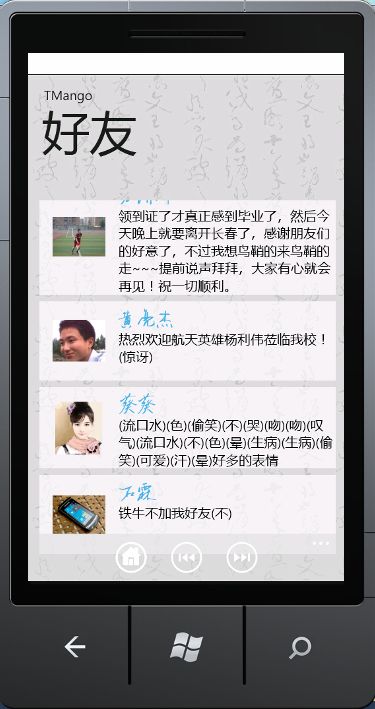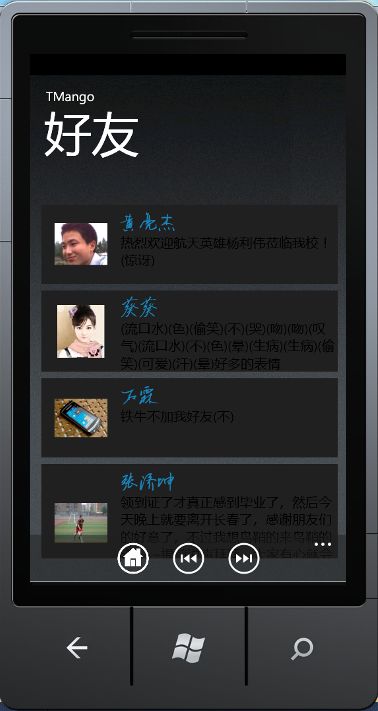WP7中对ListBox的ItemTemplate中子元素的后台操作
为了使自己开发的软件更加适应Windows Phone 7所提供的两套黑白主题,我们需要对主题进行判断,然后做出不同的控件外观显示效果。比如要完成一个好友列表显示,在列表的每个listbox item中的背景需要根据用户当前所选择的主题来分别显示不同的颜色,先看看前台的代码:
<
ListBox x:Name
=
"
FirstListBox
"
ItemsSource
=
"
{Binding mFriends}
"
Margin
=
"
0,-6,-12,0
"
Height
=
"
541
"
>
<
ListBox.ItemTemplate
>
<
DataTemplate
>
<
Border x:Name
=
"
borderListBox
"
Margin
=
"
5
"
CornerRadius
=
"
3
"
>
<
StackPanel Orientation
=
"
Horizontal
"
>
<
Image Height
=
"
80
"
Margin
=
"
20
"
Width
=
"
80
"
Source
=
"
{Binding Image_Url}
"
>
</
Image
>
<
StackPanel
>
<
StackPanel Orientation
=
"
Horizontal
"
>
<
TextBlock Margin
=
"
0,10,0,0
"
Text
=
"
{Binding Name}
"
FontFamily
=
"
/Fonts/YGY20070701.ttf#叶根友钢笔行书简体
"
Foreground
=
"
{StaticResource UseNameUnSelectedBrush}
"
TextWrapping
=
"
Wrap
"
FontSize
=
"
28
"
/>
<
Image Name
=
"
VipImage
"
Source
=
"
{Binding Vip}
"
Width
=
"
32
"
Height
=
"
32
"
></
Image
>
</
StackPanel
>
<
TextBlock Width
=
"
328
"
Text
=
"
{Binding message}
"
Foreground
=
"
Black
"
TextWrapping
=
"
Wrap
"
/>
</
StackPanel
>
</
StackPanel
>
</
Border
>
</
DataTemplate
>
</
ListBox.ItemTemplate
>
</
ListBox
>
那么如何获取ListBox中的StackPanel这个子元素的值呢,又如何来对每个Item的背景色进行改变呢?我们可以用下面的方法来进行判断,首先获取当前系统所使用的背景色,然后遍历ListBox中的每个item,利用泛型函数对该ListBox的整个visual tree进行读取,根据需要选择StackPanel类型的控件(这里读者可以根据实际情况做改动。)
方法一:
var back
=
Application.Current.Resources[
"
PhoneBackgroundColor
"
].ToString();
if
(back
==
"
#FF000000
"
)
{
for
(
int
i
=
0
; i
<
FirstListBox.Items.Count; i
++
)
{
ListBoxItem item
=
this
.FirstListBox.ItemContainerGenerator.ContainerFromIndex(i)
as
ListBoxItem;
StackPanel border
=
FindFirstElementInVisualTree
<
StackPanel
>
(item);
border.Background
=
new
SolidColorBrush(Color.FromArgb(
170
,
255
,
255
,
255
));
}
}
else
{
for
(
int
i
=
0
; i
<
FirstListBox.Items.Count; i
++
)
{
ListBoxItem item
=
this
.FirstListBox.ItemContainerGenerator.ContainerFromIndex(i)
as
ListBoxItem;
StackPanel border
=
FindFirstElementInVisualTree
<
StackPanel
>
(item);
border.Background
=
new
SolidColorBrush(Color.FromArgb(
255
,
34
,
34
,
34
));
}
}
private
T FindFirstElementInVisualTree
<
T
>
(DependencyObject parentElement)
where
T : DependencyObject
{
var count
=
VisualTreeHelper.GetChildrenCount(parentElement);
if
(count
==
0
)
return
null
;
for
(
int
i
=
0
; i
<
count; i
++
)
{
var child
=
VisualTreeHelper.GetChild(parentElement, i);
if
(child
!=
null
&&
child
is
T)
{
return
(T)child;
}
else
{
var
result
=
FindFirstElementInVisualTree
<
T
>
(child);
if
(result
!=
null
)
return
result;
}
}
return
null
;
}
好了看看效果吧(只是个示例,更炫的效果还需要读者自己斟酌了呵呵)PS:背景我采用了两张图片。


方法二:
还有个方法来进行操作,可以看下面方法,方法是参照
WindowsPhoneGeek网站上的,大家也可以看看。
private
void
SearchVisualTree(DependencyObject targetElement)
{
var count
=
VisualTreeHelper.GetChildrenCount(targetElement);
if
(count
==
0
)
return
;
for
(
int
i
=
0
; i
<
count; i
++
)
{
var child
=
VisualTreeHelper.GetChild(targetElement, i);
if
(child
is
StackPanel)
{
StackPanel targetItem
=
(StackPanel)child;
var back
=
Application.Current.Resources[
"
PhoneBackgroundColor
"
].ToString();
if
(back
==
"
#FF000000
"
)
{
targetItem.Background
=
new
SolidColorBrush(Color.FromArgb(
255
,
34
,
34
,
34
));
}
else
{
targetItem.Background
=
new
SolidColorBrush(Color.FromArgb(
170
,
255
,
255
,
255
));
}
}
else
{
SearchVisualTree(child);
}
}
}
调用的时候只需要用下面这个函数就可以了,看起来比第一个方法更简单:
this
.SearchVisualTree(
this
.FirstListBox);
|
